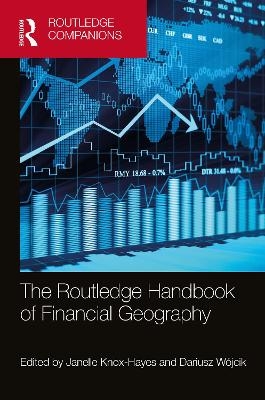
The Routledge Handbook of Financial Geography
Routledge (Verlag)
978-0-8153-6973-8 (ISBN)
This handbook is a comprehensive and up to date work of reference that offers a survey of the state of financial geography. With Brexit, a global recession triggered by the COVID-19 pandemic, as well as new financial technology threatening and promising to revolutionize finance, the map of the financial world is in a state of transformation, with major implications for development.
With these developments in the background, this handbook builds on this unprecedented momentum and responds to these epochal challenges, offering a comprehensive guide to financial geography. Financial geography is concerned with the study of money and finance in space and time, and their impacts on economy, society and nature. The book consists of 29 chapters organized in six sections: theoretical perspectives on financial geography, financial assets and markets, investors, intermediation, regulation and governance, and finance, development and the environment. Each chapter provides a balanced overview of current knowledge, identifying issues and discussing relevant debates. Written in an analytical and engaging style by authors based on six continents from a wide range of disciplines, the work also offers reflections on where the research agenda is likely to advance in the future.
The book’s key audience will primarily be students and researchers in geography, urban studies, global studies and planning, more or less familiar with financial geography, who seek access to a state-of-the art survey of this area. It will also be useful for students and researchers in other disciplines, such as finance and economics, history, sociology, anthropology, politics, business studies, environmental studies and other social sciences, who seek convenient access to financial geography as a new and relatively unfamiliar area. Finally, it will be a valuable resource for practitioners in the public and private sector, including business consultants and policy-makers, who look for alternative approaches to understanding money and finance.
Janelle Knox-Hayes is an Associate Professor of Economic Geography and Planning and Head of the Environmental Policy and Planning Group in the Department of Urban Studies and Planning, MIT. Dariusz Wójcik is a Professor of Economic Geography at the School of Geography and the Environment, Oxford University, and Fellow of St Peter’s College, Oxford.
Introduction Part A. Theoretical perspectives in financial geography 2.Financial and Business Services: A Guide for the Perplexed 3. Foundations of Marxist Financial Geography 4. Cultural Economy of Finance 5. Beyond (de)regulation: law and the production of financial geographies 6. Financial Ecosystems and Ecologies Part B. Financial assets and markets 7. From Cowry Shells to Cryptos: Evolving geographies of currency 8. The geography of global stock markets and overseas listings 9. Housing under the empire of finance 10. Commodities 11. Infrastructure: The Harmonization of an Asset Class and Implications for Local Governance Part C. Investors 12. Long-Term Investment Management: The Principal–Agent Problem and Metrics of Performance 13. Knowledge, experience, and financial decision-making 14. Household Finance 15. Impact investors: The ethical financialization of development, society and nature 16. The Foundations of Development Banking: A Critical Review Part D. Intermediation 17. Banks and Credit 18. Insurance, and the prospects of insurability 19. Unbundling value chains in finance: offshore labor and the geographies of finance 20. FinTech: The dis/re-intermediation of finance? Part E. Regulation and governance 21. Legal Foundations of Finance 22. Central Banks and the Governance of Monetary Space 23. Financial geography, imbalances and crises: Excavating the spatial dimensions of asymmetric power 24. Credit Rating Agencies in the Era of Neoliberal Capitalism 25. Offshore and the Political and Legal Geography of Finance: 1066-2020 AD Part F. Finance, development and the environment 26. Finance and Development in sub-Saharan Africa 27. The renewable energy revolution: Risk, investor and financing structures – with case studies from Germany and Kenya 28. Finance and Climate Change 29. Environmental Sustainability and Finance
| Erscheinungsdatum | 15.01.2021 |
|---|---|
| Reihe/Serie | Routledge Companions in Business, Management and Marketing |
| Zusatzinfo | 25 Tables, black and white; 65 Line drawings, black and white; 65 Illustrations, black and white |
| Verlagsort | New York |
| Sprache | englisch |
| Maße | 152 x 229 mm |
| Gewicht | 1260 g |
| Themenwelt | Mathematik / Informatik ► Mathematik ► Finanz- / Wirtschaftsmathematik |
| Naturwissenschaften ► Geowissenschaften ► Geografie / Kartografie | |
| Wirtschaft ► Betriebswirtschaft / Management ► Rechnungswesen / Bilanzen | |
| Wirtschaft ► Betriebswirtschaft / Management ► Unternehmensführung / Management | |
| Wirtschaft ► Volkswirtschaftslehre | |
| ISBN-10 | 0-8153-6973-5 / 0815369735 |
| ISBN-13 | 978-0-8153-6973-8 / 9780815369738 |
| Zustand | Neuware |
| Informationen gemäß Produktsicherheitsverordnung (GPSR) | |
| Haben Sie eine Frage zum Produkt? |
aus dem Bereich


